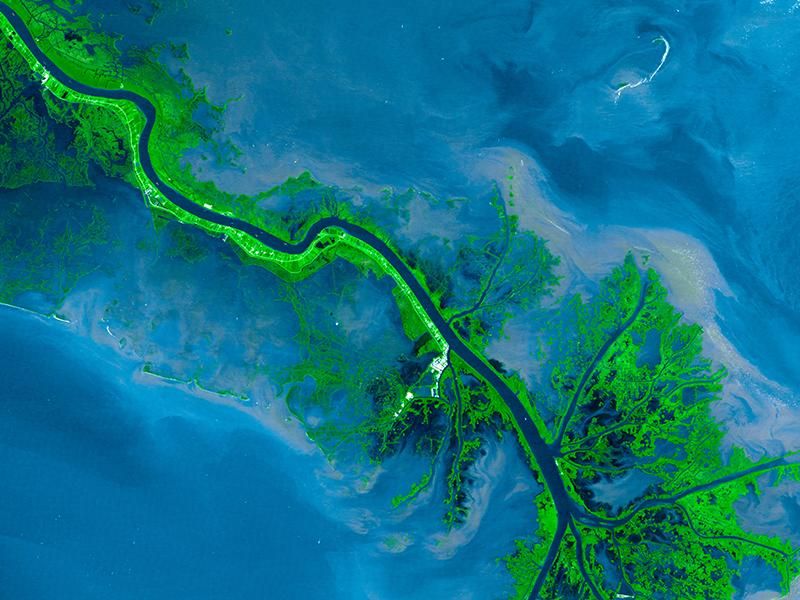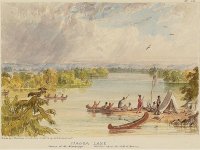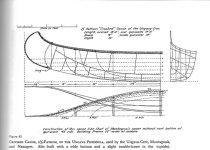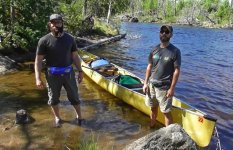-
Happy Discovery of the Rosetta Stone (1799)! 𓋹𓂀𓀮𓀛𓀾𓁀 𝞹βδΔ
You are using an out of date browser. It may not display this or other websites correctly.
You should upgrade or use an alternative browser.
You should upgrade or use an alternative browser.
Mississippi Speed Record
- Thread starter Clint
- Start date
That is what I was thinking also.They picked a good year for it ! The Miss is roaring right now !
Fixed minds with hurried goals. On the other hand one might explore the big river with broader views.
Kinda like speed walking Americana history.

 www.smithsonianmag.com
www.smithsonianmag.com
Kinda like speed walking Americana history.

The 70 Million-Year-Old History of the Mississippi River
Dive into the secret past and uncertain future of the body of water that has defined a nation
Excellent article, Odyssey.Fixed minds with hurried goals. On the other hand one might explore the big river with broader views.
Kinda like speed walking Americana history.

The 70 Million-Year-Old History of the Mississippi River
Dive into the secret past and uncertain future of the body of water that has defined a nationwww.smithsonianmag.com
Note the "crooked canoe" in the foreground of the Lake Itasca water color,

...similar to the one in Adney and Chapelle's Bark Canoes and Skin Boats of North America. It must have been tough to paddle on a windy lake. The posture of the bow paddler in the third canoe suggests that he/she is poling.

I am finding out here there are some more than others. Especially the fixed mind part.Fixed minds with hurried goals.
"For 16 hours of the day, three will paddle while the fourth gets four hours of rest, rotating every four hours. For the remaining eight hours at night, two will paddle while the other two sleep in four-hour shifts."
Mississippi Speed Record Attempt
"...and, most crucially, cut-outs in the middle two seats to deploy WAG bags." Now that's what I'd call hit-and-sh*t paddling. 
Last edited:
When I was younger, the thoughts of such endurance contests really held some interest for me. I was a dedicated masochist, and routinely proved it.
The thought of paddling the Mississippi would still hold a lot of interest for me, just not the record breaking part, although I totally get the mindset. Although I would draw the line at the aforementioned "hit and sh*t" practice.
The thought of paddling the Mississippi would still hold a lot of interest for me, just not the record breaking part, although I totally get the mindset. Although I would draw the line at the aforementioned "hit and sh*t" practice.
The Mississippi River looks like an excellent watershed to spend some tripping time exploring.

 doingmiles.com
doingmiles.com

Mississippi River: Source to Sea by Canoe
Trip Summary What: down the Mississippi River by canoe, from Lake Itasca, Minnesota to the Gulf of Mexico. Where: Central United States; MN, WI, IA, IL, MO, KY, TN, AR, MS, LA. When: August 12 - October 8, 2014 (58 days).
 doingmiles.com
doingmiles.com
Looks like they started this morning.
From the article you posted @Glenn MacGrady I find their sleep schedule interesting. I could not imagine paddling that Min4 at night with 2 people. I bet that is a slog. But maybe it is more of just guiding it down the river and less about propulsion?
“When you stretch a race out to this long, it becomes as much about teamwork, logistics, planning and strategy as it does about pure paddling ability, athletics and being in shape,” said Miller.
Miller and his teammates are well versed in what it takes to stage a successful campaign. Each has a resume of long-distance paddling and endurance race accomplishments, including finishing some of the most grueling events like the Great Alabama 650.
For 16 hours of the day, three will paddle while the fourth gets four hours of rest, rotating every four hours. For the remaining eight hours at night, two will paddle while the other two sleep in four-hour shifts.
Without a sleep schedule, “your brain just stops functioning,” said Cox. “It’s a race against the clock, but at the same time you’re trying to stave off as much physical suffering and decline as you can.
I do not think I would ever try it. But it is nice to dream about.
From the article you posted @Glenn MacGrady I find their sleep schedule interesting. I could not imagine paddling that Min4 at night with 2 people. I bet that is a slog. But maybe it is more of just guiding it down the river and less about propulsion?
“When you stretch a race out to this long, it becomes as much about teamwork, logistics, planning and strategy as it does about pure paddling ability, athletics and being in shape,” said Miller.
Miller and his teammates are well versed in what it takes to stage a successful campaign. Each has a resume of long-distance paddling and endurance race accomplishments, including finishing some of the most grueling events like the Great Alabama 650.
For 16 hours of the day, three will paddle while the fourth gets four hours of rest, rotating every four hours. For the remaining eight hours at night, two will paddle while the other two sleep in four-hour shifts.
Without a sleep schedule, “your brain just stops functioning,” said Cox. “It’s a race against the clock, but at the same time you’re trying to stave off as much physical suffering and decline as you can.
I do not think I would ever try it. But it is nice to dream about.
Quite an adventure with a record waiting to be broken. I paddled against one of the previous record holders, Rod Price, in the first Yukon River 1000 mile race in 2009. By making some lucky successful and risky shortcut choices we out paced him by a few hours at the finish.
There are a few differences in the Y1K:
- We were allowed to paddle up to 18 hours/day (we timed it to the exact miinute) and were required to random location primitive camp for six hours each "night" to include the hours between 2315 and 0200 as officially verified by SPOT tracking. We paddled at our 6.5 mph pace some days as far as 190 miles/day in the average 6 mph current in the upper river.
- Absolutely no direct contact or support from any pit crew assistance was allowed at any time from start until the finish. But if you wanted to stop in Carmacks for an ice cream snack, or Dawson, for example for any reason, then as that option was available to any other team as well, but without taking support from or making pit crew contact. In 2010, one team spent the night in Dawson (and finished the race poorly).
- In this first 2009 race, each team was required to start with 22 Kg (44 pounds) of food/paddler on board, not including weight of water necessary to rehydrate the food. That was a lot of home dehydrated food for my seven paddler voyageur team (in six days to finish we consumed less than 1/3 of it). That ridiculous requirement was dropped in following year Y1K races.
- No WAG bags or special accommodations other than the guys using a (wide mouth) gator aid bottle, and the ladies on board brought various specialized contraptions made for their needs (met with limited success). Other than verbal warnings, there was no privacy. For more serious needs, we would stop on shore once, no more than twice a day, with total timing while stopped kept to no more than seven minutes.
-In the first few years, the entry fee was $250/paddler. More recently, with the race under new management organization, the fee has shot up to $2150/paddler! Carrying of cell phones or two way radios is no longer allowed as it once was. No stopping for self-support in Dawson or any place else outside of your primitive night camp. Originally, near-real-time online SPOT tracking for location timing calculation was made openly available to support crews and to the public waiting for a passing glimpse and encouraging cheers at the few observation points and at the finish line, but that is no longer the case under the new management rules. I used the data from each year's race to update and improve my own mapped best route for efficient planning in my future races.
There are a few differences in the Y1K:
- We were allowed to paddle up to 18 hours/day (we timed it to the exact miinute) and were required to random location primitive camp for six hours each "night" to include the hours between 2315 and 0200 as officially verified by SPOT tracking. We paddled at our 6.5 mph pace some days as far as 190 miles/day in the average 6 mph current in the upper river.
- Absolutely no direct contact or support from any pit crew assistance was allowed at any time from start until the finish. But if you wanted to stop in Carmacks for an ice cream snack, or Dawson, for example for any reason, then as that option was available to any other team as well, but without taking support from or making pit crew contact. In 2010, one team spent the night in Dawson (and finished the race poorly).
- In this first 2009 race, each team was required to start with 22 Kg (44 pounds) of food/paddler on board, not including weight of water necessary to rehydrate the food. That was a lot of home dehydrated food for my seven paddler voyageur team (in six days to finish we consumed less than 1/3 of it). That ridiculous requirement was dropped in following year Y1K races.
- No WAG bags or special accommodations other than the guys using a (wide mouth) gator aid bottle, and the ladies on board brought various specialized contraptions made for their needs (met with limited success). Other than verbal warnings, there was no privacy. For more serious needs, we would stop on shore once, no more than twice a day, with total timing while stopped kept to no more than seven minutes.
-In the first few years, the entry fee was $250/paddler. More recently, with the race under new management organization, the fee has shot up to $2150/paddler! Carrying of cell phones or two way radios is no longer allowed as it once was. No stopping for self-support in Dawson or any place else outside of your primitive night camp. Originally, near-real-time online SPOT tracking for location timing calculation was made openly available to support crews and to the public waiting for a passing glimpse and encouraging cheers at the few observation points and at the finish line, but that is no longer the case under the new management rules. I used the data from each year's race to update and improve my own mapped best route for efficient planning in my future races.
There are a few differences in the Y1K
In brief, there apparently are no rules at all for the Guinness record run. It's just a group of paddlers running the Big Muddy however they want to.
I do think there should be a distinction between a supported run, like this one, and a self-supported run. I'd personally be more impressed by a team that has to carry, cache or buy their own food and supplies along the way than a team that has infinite barge and personnel support and supplies.
Sounds like the new mgmt has sucked the fun out of it and is trying to turn a profit. Boo hiss.Quite an adventure with a record waiting to be broken. I paddled against one of the previous record holders, Rod Price, in the first Yukon River 1000 mile race in 2009. By making some lucky successful and risky shortcut choices we out paced him by a few hours at the finish.
There are a few differences in the Y1K:
- We were allowed to paddle up to 18 hours/day (we timed it to the exact miinute) and were required to random location primitive camp for six hours each "night" to include the hours between 2315 and 0200 as officially verified by SPOT tracking. We paddled at our 6.5 mph pace some days as far as 190 miles/day in the average 6 mph current in the upper river.
- Absolutely no direct contact or support from any pit crew assistance was allowed at any time from start until the finish. But if you wanted to stop in Carmacks for an ice cream snack, or Dawson, for example for any reason, then as that option was available to any other team as well, but without taking support from or making pit crew contact. In 2010, one team spent the night in Dawson (and finished the race poorly).
- In this first 2009 race, each team was required to start with 22 Kg (44 pounds) of food/paddler on board, not including weight of water necessary to rehydrate the food. That was a lot of home dehydrated food for my seven paddler voyageur team (in six days to finish we consumed less than 1/3 of it). That ridiculous requirement was dropped in following year Y1K races.
- No WAG bags or special accommodations other than the guys using a (wide mouth) gator aid bottle, and the ladies on board brought various specialized contraptions made for their needs (met with limited success). Other than verbal warnings, there was no privacy. For more serious needs, we would stop on shore once, no more than twice a day, with total timing while stopped kept to no more than seven minutes.
-In the first few years, the entry fee was $250/paddler. More recently, with the race under new management organization, the fee has shot up to $2150/paddler! Carrying of cell phones or two way radios is no longer allowed as it once was. No stopping for self-support in Dawson or any place else outside of your primitive night camp. Originally, near-real-time online SPOT tracking for location timing calculation was made openly available to support crews and to the public waiting for a passing glimpse and encouraging cheers at the few observation points and at the finish line, but that is no longer the case under the new management rules. I used the data from each year's race to update and improve my own mapped best route for efficient planning in my future races.
Increase of 250 to 2150 per paddler. That is insane. 4000 bucks to do the Amazon race. That is a huge bar to cross for most folks. I am finacially better off then most folks and could afford to do these races but still find the opportunity cost way to high. That is a great way to destroy a sport.
We had the opportunity to watch them go under a couple of bridges near our house on Wednesday, their first day, they're really cruising along. I don't think I'd ever want to travel this way, but I'm fascinated watching their progress online.
I hope they can keep it up all the way to the Gulf of Mexico.
I hope they can keep it up all the way to the Gulf of Mexico.
"...and, most crucially, cut-outs in the middle two seats to deploy WAG bags." Now that's what I'd call hit-and-sh*t paddling.
The great thing about the MR340 is it's about at the limit of what you can do without sleeping or pooping, ~36-48 hours for podium finishes in most classes. You don't see anybody slamming bran muffins at the start.
...
“When you stretch a race out to this long, it becomes as much about teamwork, logistics, planning and strategy as it does about pure paddling ability, athletics and being in shape,” said Miller.
Miller and his teammates are well versed in what it takes to stage a successful campaign. Each has a resume of long-distance paddling and endurance race accomplishments, including finishing some of the most grueling events like the Great Alabama 650.
...
If anyone is looking for a crazy race, the AL650's qualifying races list is a good place to start:
R2AK - USA (no sails)
Yukon 1000 - Canada/USA
Yukon River Quest - Canada
Everglades Challenge (paddle only, no sails) - USA
Suwanee 230 - USA
Lowcountry River Rats Challenge 235 - USA
Massive Murray Paddle - Australia
Texas Water Safari - USA
La Ruta Maya Belize River Challenge - Belize
Devizes to Westminster International Canoe Marathon - UK
Loire 725 - France
Mississippi 140 - USA
Berg River Canoe Marathon - South Africa
Campus to Coast 160 - USA
MR340 (60-hour finish or faster) - USA
Dusi Canoe Marathon (non-stop version only) - South Africa
Au Sable Canoe Marathon - USA
SUP 11 City Tour - Netherlands
Kingston to Ottawa (200K distance only) - Canada
Tour du Teche - USA
So many rivers, so little time.
- Joined
- Aug 10, 2018
- Messages
- 1,731
- Reaction score
- 2,609
Gotta admit; that may be the best argument I've ever heard for rushing through a paddling trip. Still not enough to get me racing but I'll admit the idea has merit.So many rivers, so little time.
Similar threads
- Replies
- 43
- Views
- 4K
- Replies
- 17
- Views
- 1K
- Replies
- 0
- Views
- 254
- Replies
- 14
- Views
- 915

